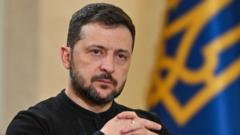In a critical moment for Ukraine, President Volodymyr Zelensky finds himself facing a myriad of challenges following the recent suspension of US aid. The situation escalated after a tumultuous meeting with President Donald Trump last Friday, after which Zelensky’s options appeared to be dwindling rapidly.
The relationship between the two leaders has soured, with Trump reportedly expressing frustration and suggesting that Zelensky might need to either change his approach or step down. This ultimatum from a previously supportive Republican ally like Senator Lindsey Graham has intensified the precariousness of Zelensky's position.
As discussions over a prospective minerals deal lingered, it became evident that both nations had much to gain, yet trust is eroding. Zelensky was poised to finalize the agreement before his abrupt dismissal from the Oval Office. Now, Zelensky’s chief aide, Andriy Yermak, is engaged in talks with Congressman Brian Fitzpatrick, emphasizing the deal's critical nature for both Ukraine and the United States.
Yet, as Zelensky weighs these heavy decisions, including the prospect of extending an olive branch to Trump, he must contend with the sentiments of his constituents. After years of enduring Russian attacks, the calls for capitulation or an apology are met with resistance, as the Ukrainian populace desires a steadfast leader, rather than a figure who appears conciliatory.
Diplomatic relations may depend on a ceasefire agreement that favors Trump’s terms; whether this would facilitate a resumption of aid remains uncertain. Vital voices within Ukraine, such as Oleksandr Merezhko, chair of the foreign affairs committee, highlight the immediate ramifications of US aid suspension on national security.
Resigning from his position is firmly off the table for Zelensky. With ongoing martial law established due to the Russian invasion, he affirms that it would be undemocratic to allow external pressure to dictate Ukrainian leadership. A resignation would play directly into the hands of Vladimir Putin, who has long sought to displace Zelensky.
Shifting focus to reliance on Europe brings an additional facet to the ongoing dilemma. Ukrainian officials express determination to survive on their own efforts, yet they also acknowledge the limitations that come from US military pauses, particularly concerning essential air defense systems. Prime Minister Denys Shmyhal does indicate that Ukraine has ramped up its production but concedes that support from the US remains non-negotiable for full-fledged survival.
Meanwhile, the European Union, under the guidance of Ursula von der Leyen, is positioning itself to enhance both its own defense capabilities and support programs for Ukraine with potential funding reaching up to €800 billion. Still, confidence in US security assurances is paramount for both Ukraine and broader European stability, as every move is meticulously calculated amid this ongoing geopolitical chess game.
The relationship between the two leaders has soured, with Trump reportedly expressing frustration and suggesting that Zelensky might need to either change his approach or step down. This ultimatum from a previously supportive Republican ally like Senator Lindsey Graham has intensified the precariousness of Zelensky's position.
As discussions over a prospective minerals deal lingered, it became evident that both nations had much to gain, yet trust is eroding. Zelensky was poised to finalize the agreement before his abrupt dismissal from the Oval Office. Now, Zelensky’s chief aide, Andriy Yermak, is engaged in talks with Congressman Brian Fitzpatrick, emphasizing the deal's critical nature for both Ukraine and the United States.
Yet, as Zelensky weighs these heavy decisions, including the prospect of extending an olive branch to Trump, he must contend with the sentiments of his constituents. After years of enduring Russian attacks, the calls for capitulation or an apology are met with resistance, as the Ukrainian populace desires a steadfast leader, rather than a figure who appears conciliatory.
Diplomatic relations may depend on a ceasefire agreement that favors Trump’s terms; whether this would facilitate a resumption of aid remains uncertain. Vital voices within Ukraine, such as Oleksandr Merezhko, chair of the foreign affairs committee, highlight the immediate ramifications of US aid suspension on national security.
Resigning from his position is firmly off the table for Zelensky. With ongoing martial law established due to the Russian invasion, he affirms that it would be undemocratic to allow external pressure to dictate Ukrainian leadership. A resignation would play directly into the hands of Vladimir Putin, who has long sought to displace Zelensky.
Shifting focus to reliance on Europe brings an additional facet to the ongoing dilemma. Ukrainian officials express determination to survive on their own efforts, yet they also acknowledge the limitations that come from US military pauses, particularly concerning essential air defense systems. Prime Minister Denys Shmyhal does indicate that Ukraine has ramped up its production but concedes that support from the US remains non-negotiable for full-fledged survival.
Meanwhile, the European Union, under the guidance of Ursula von der Leyen, is positioning itself to enhance both its own defense capabilities and support programs for Ukraine with potential funding reaching up to €800 billion. Still, confidence in US security assurances is paramount for both Ukraine and broader European stability, as every move is meticulously calculated amid this ongoing geopolitical chess game.






















